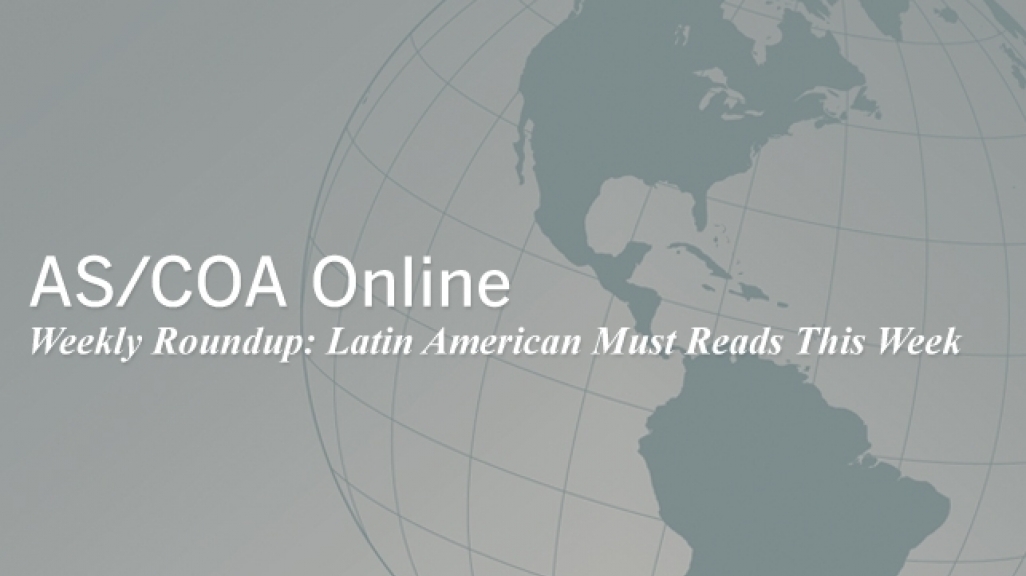Weekly Roundup: Uruguay's Election, Chile's Education Reform, Brazil's Runoff
Weekly Roundup: Uruguay's Election, Chile's Education Reform, Brazil's Runoff
The governor of Guerrero steps down in the wake of student disappearances in Mexico, Latin American FDI drops in first half of the year, and Honduras acquires new arms for anti-trafficking efforts. Read these stories and more.
Mexico: Guerrero Governor Steps Down in Wake of Student Disappearances
With the whereabouts still unknown of 43 students who went missing in the Mexican state of Guerrero, Governor Ángel Aguirre stepped down from his post on Thursday following protests demanding justice for the disappeared in cities across the country, including the capital. The students went missing at the end of September in the town of Iguala; the town’s mayor has since fled and is thought to have ordered local police to attack the students. Although authorities have uncovered at least nine mass graves in Guerrero since they disappeared, none contained the students’ bodies. Protesters set Iguala’s city hall on fire on Wednesday. Mexican President Enrique Peña Nieto condemned the act, saying: “It is incongruent to demand justice with actions that violate the rule of law.”
Brazil Prepares for Close Presidential Runoff Vote
On October 26, Brazilians elect their next president in a close runoff race. According to the latest Datafolha and Ibope polls President Dilma Rousseff leads by over 5 points, though a new Sensus poll gives Senator Aécio Neves a 9-point advantage. Ibope’s President Carlos Augusto Montenegro told UOL News that this is “the most difficult election in history” and that the election will be decided vote by vote. Época Magazine highlighted the divisiveness of the election this week, calling it the “most virulent presidential race in 25 years.” Meanwhile, Datafolha Executive Director Mauro Paulino argued earlier this month that the vote will come down to socioeconomic divisions, noting that the middle class is the most divided between the two candidates. The final debate takes place Friday night on Globo, the country’s largest TV network, and will include questions from undecided voters.
Follow the runoff race and election day on AS/COA Online’s Storify.
Uruguay Polls Predict Runoff, No Parliamentary Majority
The final polls before Uruguay's October 26 presidential election predict the vote will go to a runoff between the ruling Broad Front party's Tabaré Vázquez and leading opposition candidate Luis Lacalle Pou. An October 22 Equipos Consultores poll estimates the ruling Broad Front party will receive 41 percent of the first-round vote, with Lacalle Pou’s National Party receiving 29.2 percent. The pollster's director, Ignacio Zuasnábar, said that in addition to an "extremely competitive" runoff between Vázquez and Lacalle Pou, voters shouldn’t expect any party to win a majority in parliament. In addition, a once-popular referendum to lower Uruguay's age of criminal responsibility from 18 to 16 is not expected to pass. On October 22, three pollsters—Factum, Equipos, and Opción—projected that support for the initiative has fallen below the absolute majority needed for its passage.
Get the numbers on Uruguay’s election in an AS/COA Online infographic.
Chile’s Lower House Passes Education Reform Package
On October 21, Chile’s Chamber of Deputies approved President Michelle Bachelet’s education reform package after six hours of debate. If passed, the bill—which now goes to the Senate education commission—would remove selective entrance requirements at state-subsidized universities and would ban schools receiving state funds from operating for profit. Overhauling Chile’s education system formed a key pillar of Bachelet’s election campaign in 2013, following several years of student protests.
Read a World Politics Review piece by COA’s Eric Farnsworth on Bachelet’s approach to reforms.
Next U.S. Congress Could Have Record Number of Latino Representatives
The U.S. midterm elections on November 4 could boost the number of Latinos in the House of Representatives to 32, marking a record for the most Hispanics in Congress, reports Fox News Latino. Plus, nearly 20 Latinos are running for statewide office. Though voter participation among the Latino electorate is low, the National Association of Latino Elected and Appointed Officials estimates 1.2 million more Latino voters will vote in this year’s midterms compared to 2010.
Learn more about the role of Latino voters during the upcoming midterm vote.
Average FDI Drops by Nearly a Quarter in 13 LatAm Countries
On October 23, the Economic Commission for Latin America and the Caribbean (ECLAC) reported that 13 Latin American and Caribbean countries saw inflows of foreign direct investment (FDI) drop an average of 23 percent in the first half of 2014. ECLAC attributed part of the decrease to inflated FDI flows to Mexico last year due to a large multinational purchase. This year, there was also a lack of large corporate acquisitions and the slowing of mining investments, particularly in Chile, which saw FDI decrease by 16 percent. However, six countries registered FDI increases: Brazil (8 percent), Colombia (10 percent), Dominican Republic (20 percent), Guatemala (3 percent), Panama (26 percent), and Uruguay (9 percent).
Read about investment flows in Latin America in Americas Quarterly.
Honduras Acquires Military Weapons from Brazil and Taiwan
Reuters reports that this month the Honduran government acquired new military technology to combat drug trafficking. The acquisition includes the purchase of two turboprop planes from Brazil at an undisclosed cost, and the donation of an Embraer jet and four U.S.-manufactured helicopters worth a combined $36 million, donated from Taiwan.
Get a visual breakdown and comparison of military spending in Latin America.







